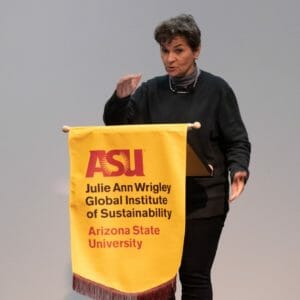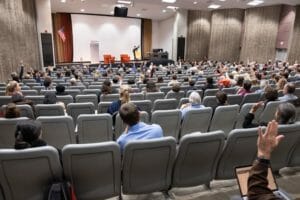At the Wrigley Lecture held on January 30 at Arizona State University, climate leader Christiana Figueres said extreme events like the Australian wildfires are foretelling of things to come if we continue to sleepwalk into the future. “That world is possible, but it is not inevitable,” she said.
Figueres is recognized internationally as a diplomatic leader on climate change. From 2010 to 2016, she was executive secretary of the United Nations Framework Convention on Climate Change. During her tenure, Figueres brought together national and sub-national governments, corporations and activists, financial institutions and NGOs to deliver the historic Paris Agreement on climate change. To accelerate the global response to climate change, Figueres founded Global Optimism Ltd., a purpose-driven enterprise focused on social and environmental change. On February 25, 2020, Figueres is launching her new book, “The Future We Choose: Surviving the Climate Crisis.”
Figueres’s Wrigley Lecture was focused on the responsibility and opportunity for all of us to cut carbon dioxide emissions in half during this decade. In order to do that, we must have optimism, Figueres said. “Even if you don’t know how you’re going to solve a certain problem or meet an ambitious target, you must set a clear destination and throw everything you have toward it.”
Highlighting the ways the world is already responding to climate change, Figueres mentioned court cases and corporate transformation. “Bright young people do not want to sell their brains to corporations who are irresponsible and are robbing them of their future,” she said. Not only that, but “there are no jobs and no clients on a dead planet.”
Figueres said that we’ve backed ourselves up against the wall so badly that now, we need systemic change as well as bottom-up, individual change. She outlines multiple actions individuals can take:
2. Economic signals: What you eat and buy sends signals to companies and markets. Start demanding sustainable, low-carbon products and services. And buy less — do you really need so many things?
3. Savings: Do you know where your savings and investments are? Divest in coal, oil and gas. “Do not prop up industries that belong in a museum.”
4. Amplification: Modern tools such as social media give us the potential to amplify any movement. Speak up and grow your voice.
“We are not victims of the past, we are co-creators of the future,” Figueres said. This is a crucial decade to drastically cut our carbon emissions (in half by 2030), and we all have the huge responsibility, privilege and opportunity to act for a healthy, happy future with fresh air, clean energy and biodiverse ecosystems. We have many possible futures depending on the actions we take in this decade, and we need to “exit this highway of business as usual.”

